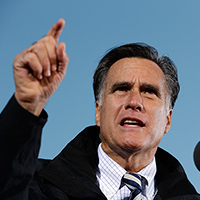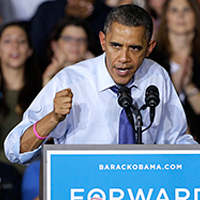We asked our Facebook friends: “What would you have asked the candidates if you had been in the audience at the town hall debate?” We got hundreds of replies on a range of topics. From now until Election Day (Nov. 6), we’ll do our best to answer your questions for the candidates by researching what they’ve said on the issues in the past.
Vanessa Duve would ask the candidates:
“GMO seeds and the ever increasing use of pesticides are causing huge problems and concerns around the globe. Will you label GMOs?”
 Mitt Romney has not taken a position on GMO labeling.
Mitt Romney has not taken a position on GMO labeling.
Last month an investigative report at The Nation revealed Romney’s close business relationship with Monsanto, the company that has come to personify the genetically modified food market, during his Bain Capital days. According to reporter Wayne Barrett, the “romance between Romney and Monsanto” began in 1977, shortly after Romney left Harvard Law and Business School. During the 1980s, Romney helped John W. Hanley, the Monsanto CEO at the time, to rehabilitate the company’s image by changing public associations with Monsanto from their work with Agent Orange and bovine growth hormones to less controversial products like genetically engineered crops and Round-up, the weed-killer.
Barrett also detailed Romney’s current links to the company, including a number of appointees to his agricultural advisory committee.
During the presidential primaries this past March, Romney named an eleven-member Agricultural Advisory Committee that was packed with Monsanto connections, including its principal Washington lobbyist Randy Russell, whose firm has represented Monsanto since its founding in the 1980s and has been paid $2.4 million in lobbying fees since 1998.
Among those also appointed to the panel were another Russell client and Monsanto partner in the marketing of GM alfalfa, Land O’ Lakes CEO Chris Policinski; and Chuck Conner, whose National Council of Farmer Cooperatives (NCFC) is closely linked to Land O’ Lakes. Conner and Policinski, an NCFC director, publicly supported Monsanto’s 2010 attempts to win USDA approval for its alfalfa. Other members of the initial Romney council were Tom Nassif, whose Western Growers Association receives annual grants from Monsanto, and A.G. Kawamura, the former California agriculture secretary who championed Monsanto’s alfalfa despite a federal court ruling in the state against it.
According to Mother Jones’ Tom Philpott, Romney’s personal choices on the matter are somewhat at odds with his political choices. Phillpott cites an NBC report that Governor Romney and his wife, at least in the “privacy of his campaign jet,” eat only organic food.
 In past statements, Barack Obama has supported the labeling of GMO foods. Before the 2008 election, he said he would “immediately implement country-of-origin labeling, because Americans should know where their food comes from. We’ll let folks know whether their food has been genetically modified, because Americans should know what they’re buying.”
In past statements, Barack Obama has supported the labeling of GMO foods. Before the 2008 election, he said he would “immediately implement country-of-origin labeling, because Americans should know where their food comes from. We’ll let folks know whether their food has been genetically modified, because Americans should know what they’re buying.”
But, as food policy writer Michael Pollan pointed out last week on Democracy Now!, during his presidency, Obama has often sided with Monsanto and other companies who produce genetically modified foods, and has avoided the labeling issue. Mother Jones‘ Tom Philpott noted last October that Obama’s USDA has been “greenlighting GMO crops left and right, even while acknowledging that they generate herbicide-resistant weeds and other troubles.” Pollan hopes that California’s Prop 37 ballot intiative passes so that Obama gets the message that the political will exists for him to take a more active interest in reforming the food system in his second term. Pollan explained it to Amy Goodman:
“And that’s why this is such an important vote, because if this passes — and let us assume that Obama is re-elected — he will see there are votes in reforming the food supply. That’s why this is not just a California issue. This is a national issue. This is the first time for the food movement to pass from that moment of voting with your fork to voting with your votes for a different kind of food system. And that’s why I’ve devoted a lot of energy to writing about this and talking about it, because I think there is a lot at stake.
Obama can be moved on this issue. He has told people, you know, ‘Make me do it.’ And it’s up to us to make him do it, because he does get it. That’s one of the reasons his wife, Michelle Obama, is out there speaking about food. I think she’s building support for the kind of movement we’re talking about, by elevating the conversation about food and making the links between the way we shop, the way we eat and our health. But I think Obama simply judged the politics were not ripe yet. Well, this will ripen them dramatically, should this pass.”

